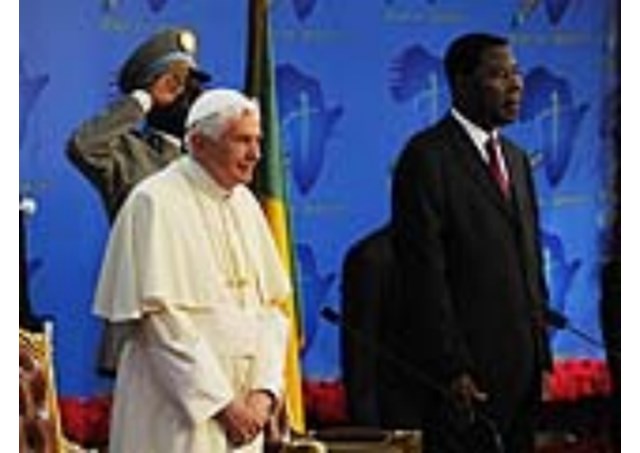
Recalling Pope Emeritus Benedict XVI’s Second Apostolic Visit to Africa to Present the Post-synodal Document Africae Munus

It is exactly three years ago this month that Pope Emeritus Benedict XVI undertook his second apostolic trip to Africa by visiting the Republic of Benin.
The main purpose of the visit from the 18-21 Nov., 2011 was to present the final document of the Second Special Assembly for Africa of the Synod of Bishops. The Second African Synod - as the special assembly is commonly known - was held in Rome in October 2009 on the theme: “The Church in Africa in Service to Reconciliation, Justice and Peace. You are the salt of the earth. Your are the light of the world.”
The pope emeritus also chose to go to Benin three years ago to celebrate 150 years since the first missionaries arrived there and to pay homage to the late Cardinal Bernardin Gantin, a native of Benin and former Dean of the College of Cardinals with whom he had worked for many years in the Vatican. And the forth reason was to mark 40 years of formal diplomatic relations between the Holy See and Benin.
During mass in Cotonou, attended by representatives of the Symposium of Episcopal Conferences of Africa and Madagascar (SECAM) on 20th November, Benedict XVI presented to the church in Africa the fruits of the second synod contained in the Post-synodal Apostolic Exhortation Africea Munus, a Latin phrase which can be translated as the Commitment Africa. The document largely brings together the 57 propositions or recommendations that came out of the synod.
Speaking during the presentation ceremony, Benedict XVI said, “Upon the reception of this Exhortation, the phase of assimilation and application of its theological, ecclesiological, spiritual and pastoral data begins at the local level.” He said “the text seeks to promote, encourage and consolidate the various local initiatives already in place as well as to inspire other initiatives for the upbuilding of the Catholic Church in Africa.”
The first of two parts of Africae Munus addresses the basic structures of the Church in the service of reconciliation, justice and peace through her mission of evangelization, with Christ at the centre of the concrete situations of Africa.
The second part of the document deals with the Church’s contributions to society through education, health care and social communications.
Some of the concrete proposals include: increased promotion of lectio divina, that is, devotional reading of Sacred Scripture to build fraternal communion; a Continental Eucharistic Congress to celebrate the fraternity established by the Eucharist, which goes beyond linguistic, tribal and ethnic differences. Local churches are encouraged to bring forth suggestions for new saints and to support SECAM.
It also suggests the promotion of annual celebrations of Reconciliation Days or Weeks, preferably in Advent or Lent.
Furthermore, the document calls for serious discernment of traditional practices, especially those connected with reconciliation, so as to highlight the aspects that help or hinder the inculturation of the Gospel. The exhortation invites all peoples to reconciliation with God and neighbour – a necessary condition of real peace.
In a continent with a plurality of religions and Christian denominations, Africae Munus also calls for dialogue with both Islam and with African traditional religions and for ecumenical dialogue and new forms of ecumenical associations to combat tendencies toward the growth of sects and the formation of independent “splinter” communities.
In discussion the issues of subsidiarity, solidarity and charity, the document said, “preferential attention must be reserved for the poor, the hungry, the sick, the imprisoned, the migrant, the refugee and the displaced.”
Turning to the dignity of the human person and the protection of life, Africae Munus asks that particular defence and protection be provided for the family, for women, for children and young people and for all human life, noting that the Church is on the front line in the fight against malaria, tuberculosis and HIV/AIDS. The fight against HIV/AIDS, it says, must have an ethical as well as a medical dimension.
Given the history of elections related violence on the continent, the post-synodal exhortation discusses good governance issues, noting the need for free and fair elections, independent judiciaries and transparency in administration. It stresses the need for equitable and proper management (stewardship) of natural resources, condemning their unjust exploitation. The document also discusses the need to fight illiteracy and anticipates the elimination of capital punishment.
In conclusion, it addresses the need for ongoing and integral faith formation for all people in every state of life within the Church, and renews the Church’s commitment to be authentic witnesses to Christ in and through her many good works.
The post-synodal document is the fruit of a process that has been going on for many years. The second synod for Africa was first announced by Saint Pope John Paul and was confirmed by Pope Benedict XVI in 2005.
The greatest challenge for the church in Africa, according to many observers is how to make Africae Munus known and implemented at the local level.
(Festus Tarawalie)
| All the contents on this site are copyrighted ©. |


